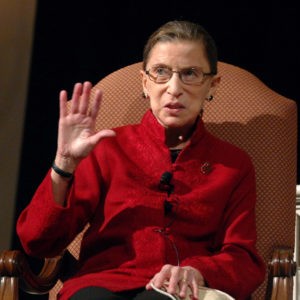The news of U.S. Supreme Court Justice Ruth Bader Ginsburg’s death on Friday felt like a kick in the gut. Although she was 87 years old and had survived several bouts of cancer, her death still came as a sudden and painful shock.
During the court’s recent and historic term of oral arguments via telephone, Ginsburg participated with her typical probing precision. We listened as witnesses to her continuing vitality, even while she was in the hospital during some arguments.

Justice Ruth Bader Ginsburg (AP Photo/Kevin Wolf)
While tributes celebrate Justice Ginsburg’s momentous achievements and contributions to the law, I am struck by the wide reach and personal nature of her impact. Early in my tenure at BJC, a wonderfully generous friend and mentor of mine from Mississippi visited D.C. for a legal conference. She invited me as her guest to an evening event at the court, where Justice Ginsburg was the keynote speaker for a small gathering. It was the ultimate gift for a young woman lawyer, one I will never forget. As retired Justice David Souter would later say in memoriam, “Ruth Ginsburg was one of the members of the court who achieved greatness before she became a great justice.”
Ginsburg’s greatness is recognized in a broad range of achievements that should be — and are being — celebrated by people from different political persuasions. She will be remembered as a fierce defender for the rights of women and other minorities seeking equality under law. Her experiences as a woman, a Jewish person and the daughter of immigrants certainly shaped her commitment to equality. Not surprisingly, her record in religious liberty cases demonstrates an understanding of how the constitutional separation of church and state works to protect all people, without favoritism.
“Her opinions in church-state cases … reflect a dedication to an ideal of religious liberty in our American legal tradition that was long seen as centrist.”
Her opinions in church-state cases during her 27 years on the court largely line up with positions advocated by BJC during that time. They reflect a dedication to an ideal of religious liberty in our American legal tradition that was long seen as centrist — with strong support for principles of both free exercise and no establishment.
Justice Ginsburg joined majority opinions that upheld strong statutory protections for free exercise. Notably, she wrote the unanimous majority opinion in Cutter v. Wilkinson (2005), upholding the prisoner provisions of the Religious Land Use and Institutionalized Persons Act as a permissible accommodation of religion that does not violate the Establishment Clause. Important to her decision was the “measured” approach the act took to “not override other significant interests,” as well as the fact that it treated all faiths equally.
These principles of fairness, equality and balancing of rights featured prominently in her strong dissent in Burwell v. Hobby Lobby (2014), in which she warned: “The court, I fear, has ventured into a minefield by its immoderate reading of RFRA (Religious Freedom Restoration Act).” She returned to this argument in her final dissent, issued this July in the case Little Sisters of the Poor v. Pennsylvania. In that case, she advocated for a balanced reading of free exercise accommodations, “one that does not allow the religious beliefs of some to overwhelm the rights and interests of others who do not share those beliefs.”
In Establishment Clause cases, she sided with those who voted against government sponsorship of religion, in cases about both government funding and religious displays on government property.
Last term, she wrote a powerful dissent in the Bladensburg cross case, American Legion v. American Humanist Association. Ginsburg’s dissenting opinion rejected the argument that the government could downplay the impact of an immense Latin cross that stands on a traffic island at the center of a busy intersection. In her view, the fact that the cross was historic and that it purported to represent all World War I veterans did nothing to diminish that impact. Her dissent, which cited BJC’s brief explaining the particularly Christian character of the cross, demonstrated her sensitivity to religious minorities and the way government can distort religion for its own purposes.
She wrote: “As I see it, when a cross is displayed on public property, the government may be presumed to endorse its religious content.” With that, a justice who had been married to a Jewish veteran spoke with respect for all religions. She also was speaking with respect for the Establishment Clause that was designed to protect religion from government interference, including by ensuring government does not prefer one religion over another.
“I felt the eyes of my colleagues turn to see my face when Justice Ginsburg pointed to an approach offered in ‘the Baptist brief’ as she questioned the oral advocates.”
Justice Ginsburg’s words in that case reminded me of one of the highlights of serving BJC and its historic commitment to religious liberty for all through our work in the courts. I was seated in the lawyer’s section of the Supreme Court — surrounded by colleagues from various religious organizations and universities — during oral arguments in the two cases that challenged government-sponsored displays of the Ten Commandments. BJC had long been a leader in opposing such displays, which tend to show government preference for religious majorities and ultimately harm religion. I felt the eyes of my colleagues turn to see my face when Justice Ginsburg pointed to an approach offered in “the Baptist brief” as she questioned the oral advocates. Our approach suggested that the court adopt a presumption that a government that sponsored a religious display endorsed the message of that display. The approach recognized that government-sponsored religious displays tend to violate the neutrality toward religion that the Constitution demands.
While the court did not adopt our proposed rule in those cases, I remain proud that Justice Ginsburg recognized our advocacy to protect religious liberty by avoiding government-sponsored religion.
With changes in the court’s composition in recent years, the Supreme Court’s jurisprudence in many areas has shifted considerably. The Establishment Clause today often means much less than reflected in the opinions Justice Ginsburg wrote and joined. The effects on religious liberty of the court’s most recent opinions will be revealed over time, but the pain of losing Justice Ginsburg is felt now.
Holly Hollman serves as general counsel of BJC (Baptist Joint Committee for Religious Liberty). She leads BJC’s amicus efforts, including more than 20 briefs filed at the U.S. Supreme Court during her tenure.
Related articles:
Why Baptist women in ministry feel a kinship to Justice Ginsburg
The Supreme Court term: Something for everyone to love and hate


